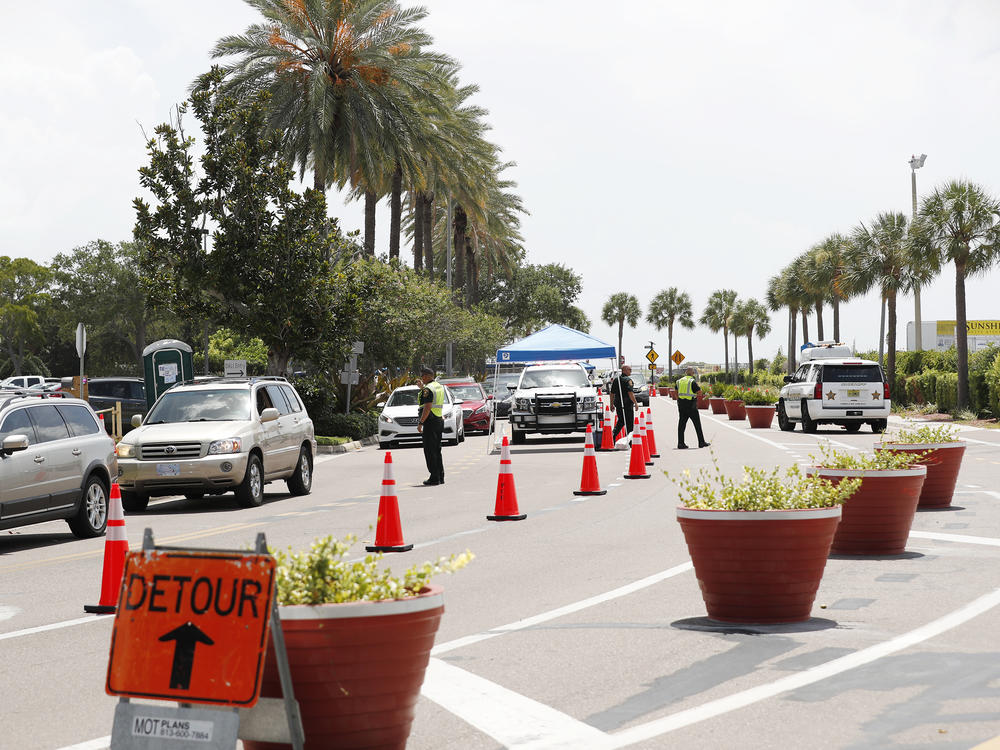Section Branding
Header Content
Florida Smashes U.S. State Record Of Daily New Cases: More Than 15,200
Primary Content
Florida reported 15,299 new coronavirus cases on Sunday, marking the largest single-day increase of any state since the start of the pandemic.
Sunday's number exceeds New York's peak of more than 12,200 new cases in one day back in April, when it was the epicenter of the outbreak.
This latest surge brings the total number of cases in the state to 269,811. Florida has recorded 4,242 total deaths, with 45 of those new as of Sunday.
"If Florida were a country, it would rank fourth in the world for the most new cases a day behind the United States, Brazil and India," Reuters noted.
As of Saturday, 7,186 people were hospitalized in Florida, according to the COVID Tracking Project.
Florida started reopening in early May and has continually shattered state records for single-day increases since cases began surging there in June.
It surpassed 10,000 new cases in one day for the first time earlier this month.
Despite the uptick in cases, many entities are continuing or resuming operations. On Saturday, as the state reported more than 10,000 new cases, two of Disney World's four area parks reopened to the public. The others are expected to open on Wednesday.
And last week, the state's Department of Education ordered schools to reopen for in-person instruction in August.
Gov. Ron DeSantis has largely resisted imposing statewide restrictions, though he did order bars to close to on-site alcohol consumption in late June.
Even with cases shattering records, DeSantis said at a June 30 news conference that the state would not roll back its reopening. He emphasized the importance of protecting vulnerable populations but stopped short of asking people to stay home.
"We're not going back, closing things," he told reporters. "I don't think that that's really what's driving it — people going to a business is not what's driving it. I think when you see the younger folks, I think a lot of it is more just social interactions, so that's natural."
While a growing number of governors have issued statewide mandates requiring face masks in public, DeSantis is not one of them. He has instead left the decision up to local governments, many of which have enacted mask mandates of their own.
Jacksonville, which is set to host the Republican National Convention in August, implemented a face covering requirement late last month.
Some local officials have also rolled back certain reopenings in an effort to slow the spread of the virus, especially in hard-hit South Florida.
In Miami-Dade County, which is considered a hot spot, Mayor Carlos Gimenez announced a countywide daily curfew from 10 p.m. to 6 a.m. effective July 3. He also rolled back the opening of entertainment facilities such as movie theaters, arcades and concert houses.
Another order, effective since July 9, closes banquet halls and ballrooms, makes masks mandatory at gyms and restricts restaurants to outdoor seating only.
And an updated emergency order took effect in Broward County on July 10, setting limits on restaurant seating and vacation rentals, with violators subject to fines and closures.
The World Health Organization also reported a record increase in global coronavirus cases on Sunday, with a rise of 230,370 in 24 hours.
Copyright 2020 NPR. To see more, visit https://www.npr.org.

